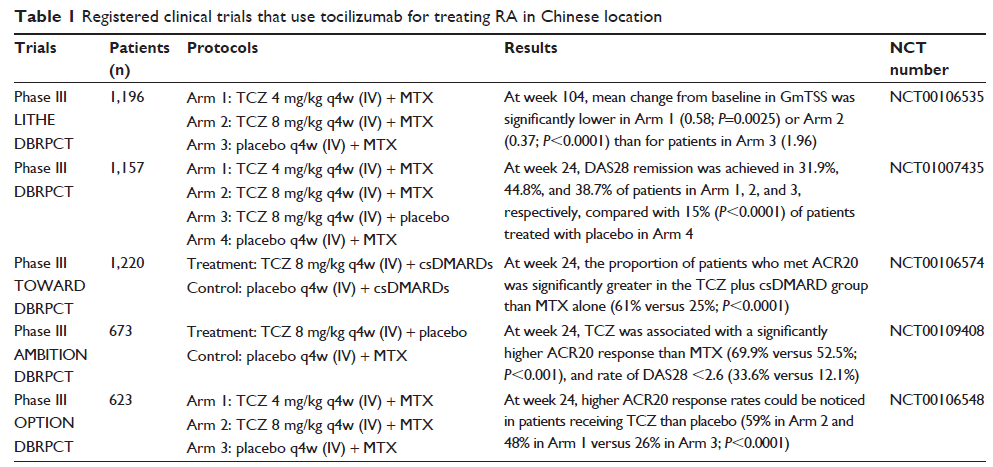109669
论文已发表
注册即可获取德孚的最新动态
IF 收录期刊
- 3.4 Breast Cancer (Dove Med Press)
- 3.2 Clin Epidemiol
- 2.6 Cancer Manag Res
- 2.9 Infect Drug Resist
- 3.7 Clin Interv Aging
- 5.1 Drug Des Dev Ther
- 3.1 Int J Chronic Obstr
- 6.6 Int J Nanomed
- 2.6 Int J Women's Health
- 2.9 Neuropsych Dis Treat
- 2.8 OncoTargets Ther
- 2.0 Patient Prefer Adher
- 2.2 Ther Clin Risk Manag
- 2.5 J Pain Res
- 3.0 Diabet Metab Synd Ob
- 3.2 Psychol Res Behav Ma
- 3.4 Nat Sci Sleep
- 1.8 Pharmgenomics Pers Med
- 2.0 Risk Manag Healthc Policy
- 4.1 J Inflamm Res
- 2.0 Int J Gen Med
- 3.4 J Hepatocell Carcinoma
- 3.0 J Asthma Allergy
- 2.2 Clin Cosmet Investig Dermatol
- 2.4 J Multidiscip Healthc

中华人民共和国对类风湿关节炎的治疗——集中于托西珠单抗 (Tocilizumab) 和患者考虑因素
Authors Wang G, Mu R, Xu HJ
Published Date May 2015 Volume 2015:8 Pages 187—194
DOI http://dx.doi.org/10.2147/IJGM.S81633
Received 26 January 2015, Accepted 10 March 2015, Published 12 May 2015
Abstract: The
prevalence of rheumatoid arthritis (RA) is 0.19%–0.41% in Chinese population.
RA exerts profound influence on health-related quality of life (HRQoL), which
imposed huge burdens on patients physically, mentally, and economically. As a
developing country, People’s Republic of China faces enormous challenges in
management of RA. Conventional-synthesized disease-modifying antirheumatic
drugs (csDMARDs) remain the most selective therapeutic options for RA in
People’s Republic of China owing to their affordable price and fair efficacy as
well as tolerability. Unfortunately, there are substantial RA patients who are
poor responders to csDMARDs, even to subsequently combined therapy with tumor
necrosis factor antagonist (anti-TNF). Tocilizumab (TCZ) has been approved as a
subsequent-line biological agent in patients with moderate-to-severe RA
worldwide including People’s Republic of China. TCZ is the first biological
agent approved for the treatment of RA inhibiting interlukin-6 (IL-6) by
blocking both membrane-bound and soluble IL-6 receptors. Open-label studies in
real-life practice and strictly controlled clinical trials demonstrated its
high efficacy and safety profile in treatment of patients with RA who have
inadequate responses to csDMARDs and anti-TNF. HRQoL of RA patients was
improved in various measurements. TCZ was associated with 1.2 times the risk of
adverse events, such as infections, dyslipidemia, and hepatic transaminases
elevation, compared with pooled placebo. A relatively long half-life allowing
for monthly intravenous administration and a newly developed subcutaneous
injection make TCZ more acceptable. However, data are not enough so far
comparing TCZ to anti-TNF. Lack of evidence in Chinese patients and high cost of
TCZ limit its prescription in People’s Republic of China being a developing
country. Further clinical trials and post-marketing surveillance may offer a
comprehensive assessment of patient satisfaction and acceptability, which may
help us define the optimal role for TCZ in therapeutic strategy.
Keywords: rheumatoid arthritis,
IL-6, tocilizumab, People’s Republic of China, health-related quality of life
